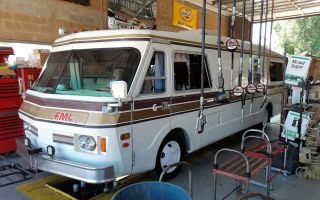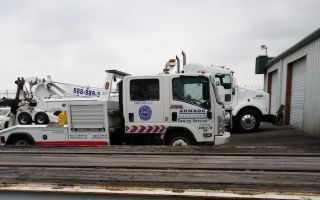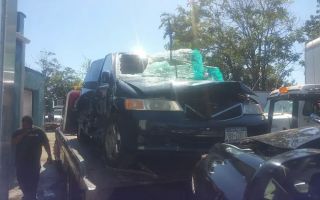How to Handle a Car Accident on a Mountain Pass
Driving on mountain passes can be an exhilarating experience, but it also comes with its unique challenges. In the event of a car accident on a mountain road, the situation can be both dangerous and stressful. As someone who has navigated the winding curves and steep drops of mountain highways, I've learned that knowing what to do in case of an accident can make a world of difference. Here's a detailed guide on how to handle a car accident on a mountain pass safely and effectively.

Les Schwab Tire Center
1694 NW 6th St, Grants Pass, OR 97526, USA
1. Ensure Immediate Safety and Prevent Further Damage
The first step in handling any car accident is ensuring the safety of everyone involved. On mountain passes, this becomes even more critical due to narrow roads and the potential for further accidents. If you are able, follow these steps:
- Move to a safe area: If the vehicle is still operational, move it off the road. This prevents additional cars from coming into the accident zone.
- Turn on hazard lights: The sharp curves and blind spots of mountain roads make it difficult for other drivers to see accidents ahead. Hazard lights can help warn oncoming traffic.
- Check for injuries: Make sure all passengers are okay. If there are serious injuries, call emergency services immediately.
- Secure the area: If you cannot move the car, use warning triangles or flares if you have them, to alert approaching vehicles.
2. Call for Help
In a mountain pass accident, getting assistance might not be as simple as calling your usual roadside service. You might be in an area with limited cell service, so having a backup plan is essential. If you have service:
- Call 911: Explain your location in detail. Mountain passes often lack clear street addresses, so use landmarks or mile markers to help responders locate you.
- Use satellite communication devices: If you’re in a remote area, a satellite phone or device like a GPS messenger can help you reach emergency services.
- Contact towing services: Many towing companies specialize in mountain roads and can offer flatbed towing, which is necessary in cases where the terrain is rough.
3. Document the Scene and Gather Information
After ensuring everyone is safe, gather as much information as possible. This will be crucial for insurance claims, police reports, and any other legal matters. Here’s what you should document:
- Take photos: Capture the position of the vehicles, the damage, and any relevant road conditions or hazards (like loose gravel or poor weather).
- Exchange information: Get the contact details and insurance information from the other driver(s). If there are any witnesses, get their contact information as well.
- Note environmental factors: Make a note of weather, road conditions, and visibility that could have contributed to the accident.
4. Handling Emotional Stress
Accidents can be stressful, and the added tension of being in a remote location with unpredictable weather conditions can escalate the situation. Here are some steps to manage stress:
- Stay calm: Take deep breaths and remain as calm as possible. Panicking won’t help the situation.
- Keep others calm: If you’re traveling with passengers, particularly children, reassure them and keep them as calm as possible.
- Wait for help: Once help is on the way, try to relax. Take note of the weather or road conditions, which might also help emergency responders understand the situation better.
5. Towing and Vehicle Recovery in Mountain Areas
In remote mountain areas, vehicle recovery can be more challenging. Not all towing companies can handle mountainous terrain. When selecting a towing service, consider the following:
- Choose a specialized service: Look for towing services that are familiar with mountain roads and can provide flatbed towing for vehicles that can’t be driven.
- Confirm availability: Not all towing services operate in mountainous regions. Be sure to confirm that the service you’ve called can reach your location.
- Prepare for delays: In mountainous areas, traffic, road conditions, and weather can cause delays in the response time. Be prepared for a wait and stay safe while waiting for assistance.
6. Post-Accident Procedures
Once your vehicle has been recovered, you’ll need to follow up with insurance and any necessary legal procedures:
- Report to insurance: Provide your insurance company with all the documentation you’ve gathered, including photos and police reports.
- Follow legal requirements: Depending on the location of the accident, you may be required to file a police report.
- Repair your vehicle: After the claim is processed, have your vehicle repaired by a reputable auto body shop. If you’re in a remote area, make sure to choose a shop with experience handling damage from mountain accidents.
7. Be Prepared for Future Mountain Pass Travels
Accidents can happen anywhere, but mountain passes present additional risks. To avoid future accidents and be better prepared:
- Drive cautiously: Always drive with caution when navigating mountain roads, especially during adverse weather conditions.
- Equip your vehicle: Ensure your vehicle is in good working condition and has the necessary equipment for mountain driving, such as snow chains or emergency kits.
- Know the route: Before traveling through remote areas, familiarize yourself with the route and check road conditions.
Handling a car accident on a mountain pass requires calm, preparation, and a clear understanding of what needs to be done. By following the steps outlined above, you can ensure the safety of yourself and others while minimizing the impact of such a stressful event.




























